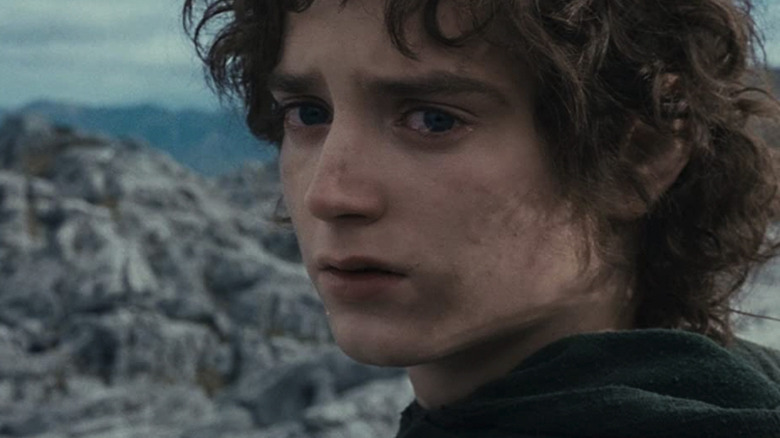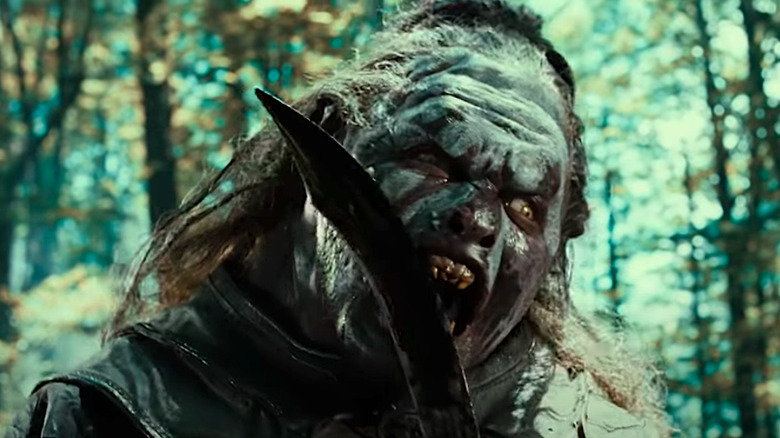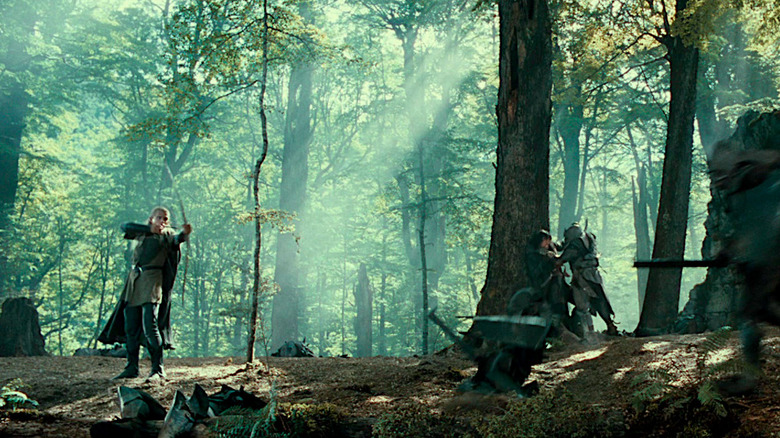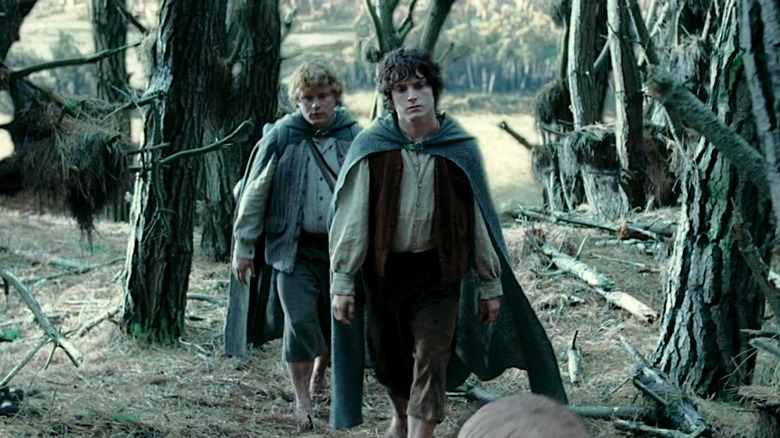The Lord Of The Rings: The Fellowship Of The Ring Ending Explained
Widely considered to be one of the greatest fantasy stories ever adapted for film, Peter Jackson's "The Lord of the Rings" trilogy is quite the series to behold. With a massive (and massively talented) cast, "The Fellowship of the Ring" kicks off the trilogy to end all trilogies by introducing us to the hobbit Frodo Baggins and his friends who must help him on his long journey to Mordor where he must destroy the One Ring, forged by the evil Sauron in the fires of Mount Doom. If he fails, Middle-earth and the lives of all who live there will become slaves to evil and darkness at the hands of Sauron. It is a heavy burden to bear (both literally and figuratively), but Frodo shoulders the burden honorably.
Unlike the other two films in the trilogy, "The Two Towers" and "Return of the King," there is something light and hopeful about "The Fellowship of the Ring" that feels missing from the other two films. Of course, a lot of this has to do simply with the fact that the series, written by the masterful J.R.R. Tolkien, only gets darker the further you go, but even so, "Fellowship" still feels special in contrast to the other two films. It is, by far, my favorite of the three (though I do thoroughly enjoy them all for different reasons), and I think the reason for that largely has to do with the film's ending.
The ending of The Fellowship of the Ring
By the end of "The Fellowship of the Ring," Frodo and his company have been through a lot. Frodo has been stabbed by a Morgul blade, Gandalf has been lost to the mines of Moria, and the fellowship is welcomed by the Elf-queen Galadriel into Lothlórien where she delivers solemn news to Frodo — he alone must take the ring to Mordor, but along the way, one of his companions will betray him and try to take the ring for themselves.
The fellowship are then ambushed by an army of ruthless Uruk-hai, but Frodo, having wandered off alone, encounters Boromir who has followed him. Boromir tries to take the ring for himself, fulfilling Galadriel's prophecy, but Frodo resists and escapes, shaken by the experience. He now knows he must leave everyone behind and finish the journey by himself. While the fellowship fights, Frodo slips into a boat and begins to take off only to be met with a frantic Samwise who wades into the water, tenderly declaring that he made a promise to Gandalf not to leave his side ("Don't you leave him, Samwise Gamgee!") and so therefore, he must go with him to Mordor. (Insert me sobbing for all eternity.)
The two escape by boat, leaving the rest of the fellowship behind. Boromir, recognizing he has made a terrible mistake, returns to help the fellowship fight, but is killed by the ruthless onslaught of arrows fired by the Orc, Lurtz, who Aragorn kills in a fight that can only be described as "badass" (the licking of that blade, my god!). Merry and Pippin have been taken captive by the rest of the Uruk-hai, and Legolas, Gimli, and Aragorn vow to "hunt some Orc" in an effort to rescue the two hobbits before it's too late. The film ends with Frodo and Samwise looking out over Middle-earth wondering if they will ever see the fellowship again. "We may yet, Mister Frodo." More sobbing from me, and scene.
The brightness before the fall
Like many first entries in a trilogy, there is a lot of setup going on here in "Fellowship." Somehow, though, Jackson manages to make it flow effortlessly, never once making it seem like explanatory fluff. Even in the film's ending where so many different things happen within a very short span of time, Jackson manages to give each thread enough space to breathe so that we are left with a very clear picture of what's to come.
Of course, the obvious surface level interpretation of the ending of "Fellowship" is that Frodo decides he must continue his journey alone (technically with Sam), and the rest of the fellowship is either captured (sorry, M. and P.!) or on the hunt. Each group clearly has their own distinct part to play in the battle for Middle-earth, and we know at the end of "Fellowship" just where each individual stands (or doesn't; R.I.P. Boromir).
But the true beauty of the ending of "Fellowship" comes in the form of its visuals. This is the only time (with the exception of the third film, but I'll get to that) where the scenery at the end appears green and lush. Despite the Orc ambush, the landscape is relatively pleasing to look at, even though so much is changing. The trees provide a sense of serenity that allows the viewer to feel hopeful when the fellowship disbands rather than fearful. There is still hope for Middle-earth and, unless you're a fan of Boromir (blow those horns of Gondor, Bormoir fans!), our heroes are still alive.
From innocence to experience
At its core, "Fellowship" is representative of the age of innocence. Frodo (perhaps foolishly) believes he only has to get the ring to Rivendell, only to realize he has a much bigger part to play. And even in the film's final moments, despite all the trauma the fellowship has been through, everyone is still largely hopeful. When Sam and Frodo look out over Middle-earth, the sun is shining down on the mountains and the scenery is fairly peaceful. They know their journey is hard, but they won't realize how hard until much later. They are merely at the start of what is to become a very long journey, and their minds and their energy are still relatively intact.
This is why I love the ending of "Fellowship." When I think back on it, even though tragic things happen within those final moments, I always see nothing but green forest. Even the score is uplifting, with the trilogy's main theme playing triumphantly as we watch each hero choose their new path. It is a decidedly different ending from "Two Towers," which ends on a desolated mountain side, Sméagol planning to lead Sam and Frodo to Shelob. There is a complete lack of color in that scene, signifying that we are now deep into this story. The relaxing days spent in the Shire have been replaced by the very real possibility that our heroes may not make it out alive.
And while it is true that "Return of the King" ends with Sam returning to the lush green landscape of the Shire, he returns a changed man. He has seen the world and then some, and the comforts of home, while appreciated, will never be enough anymore. There is a sadness to Sam as we watch him greet his wife and children, and we understand that the world has changed for all of them. Even though our heroes have won, they will never return to their innocence.



